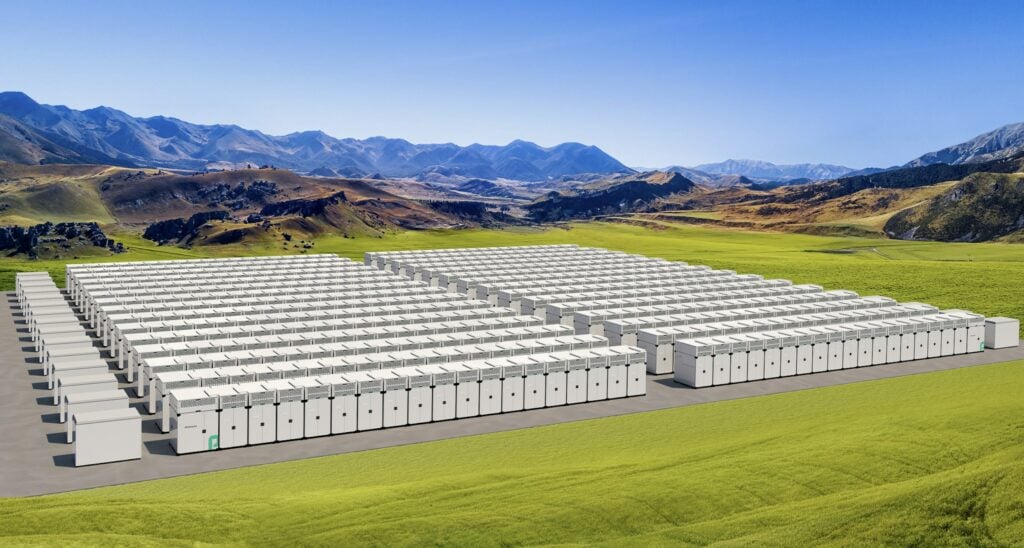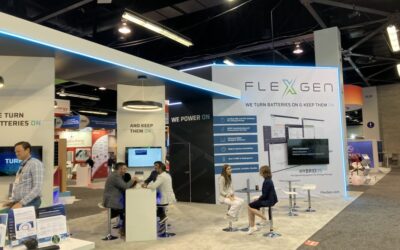
Battery energy storage system (BESS) integrator and manufacturer Powin Energy is the latest international company to target rising opportunities in India.
The Oregon-headquartered US company has entered a partnership with Indian renewables platform group O2 Power and could seek to establish local manufacturing operations, Powin executive VP Danny Lu told Energy-Storage.news.
Enjoy 12 months of exclusive analysis
- Regular insight and analysis of the industry’s biggest developments
- In-depth interviews with the industry’s leading figures
- Annual digital subscription to the PV Tech Power journal
- Discounts on Solar Media’s portfolio of events, in-person and virtual
O2 Power, established in 2019, has already been awarded 1.8GW of contracts for renewable energy assets and is backed by two investment companies, Sweden’s EQT Infrastructure and Singapore’s Temasek.
Powin meanwhile has a contracted pipeline of more than 6GWh of BESS projects around the world, albeit with a major focus on its US home market, as well as about 2GWh already installed to date. The company designs, manufactures and integrates systems using lithium battery cells from Tier 1 providers and launched its newest hardware platform, Centipede, which can fit more than 200MWh of Powin’s Stack750E units into a single acre’s footprint, last year.
Regular readers of this site will be aware that while India only got its first grid-scale BESS pilot project in 2019, the country’s government is vocally supportive of energy storage and its role in the country’s energy sector, which is targeting the deployment of 500GW of wind and solar by 2030.
Danny Lu said that in order to enter the Indian market, finding a strong local partner was of paramount importance, with Powin and O2 to split their duties along the lines of their respective core competencies.
“India is an extremely unique market in terms of the market dynamics, the barriers to entry, how to even bid on a tender — all extremely unique,” Lu said in an interview.
“We were really seeking out a high quality partner such as O2 to support [overcoming] the barriers to entry and local market dynamics.”
Along with “very good funding sources from very notable companies,” Lu said, O2 Power also has “extreme competence” in the EPC space in India. Crucially, O2 also knows how to win tenders for projects in the country.
“India is a very big market, but it also has a lot of unique things that we need local partners to really solve for us,” Danny Lu said.
O2 Power’s chief operating officer and president Peeyush Mohit said that with India having already installed more than 100GW of renewables to date and targeting half a terawatt by 2030, “batteries will play a key role in balancing a grid that has such large volumes of renewable energy capacity”.
According to industry group India Energy Storage Alliance (IESA), the country only has about 85MWh of grid-connected BESS online or under construction so far, but has a solid pipeline of 4.6GWh, including 3.3GWh tendered for and 1.2GWh of announced projects.
“We, at O2 Power, see a big opportunity in providing battery integrated solutions to power utilities as well as C&I customers desiring round-the-clock (RTC) power. Powin is a global leader in large scale energy storage solutions and by joining hands with them, we intend to bring reliable and cost-effective storage solutions to the Indian market,” Mohit said in a statement.
Already underway are large volume tenders for energy storage, including a 500MW/1,000MWh Solar Energy Corporation of India (SECI) opportunity and a tender from state-owned power company NTPC for aggregate energy storage projects totalling 500MW/3,000MWh, all “extremely large projects that we have to give our best shot,” Danny Lu said.
“Powin’s responsibility is to support O2 on sizing and design of these projects, to potentially do some local manufacturing in India, as well as supporting with competitive pricing for the India market, as well as commissioning of our systems and the long term warranties and guarantees that we have to back.”
“One of the most exciting things” about the O2 Power deal is that the new Indian partner has a well-established service arm, Lu said, which could be trained up to service, install and commission Powin’s systems and become its sole service provider in India.
Nimble manufacturing strategy
In addition to stimulating growth in the industry through tenders for deployment and adapting regulatory frameworks, India’s government is seeking to support upstream manufacturing, awarding incentives recently for 50GWh of advanced chemistry cell (ACC) battery gigafactories which could be brought online under quick timelines.
For Powin, which as a system integrator buys its cells and then assembles them, local manufacturing in India could have numerous benefits.
The company has sought to bring its manufacturing closer to demand centres in North America through a recent deal with contract manufacturer Celestica, which will produce Powin units from a base in Mexico. The confidence to be able to outsource its production in this way goes back to the opening of contract manufacturing facilities in Taiwan a few years ago, Lu said.
“That whole process made us a lot more disciplined in terms of how we design our products and then in terms of the documentation around how we designed it: the standard operating procedures, the quality control plans, all the tolerances… everything needs to be extremely dialled in, where there’s no questions or no gaps, no grey area, where if you pass along your documentation to a third party, they can read it, and know exactly how to produce and quality check your products.
“We’ve invested a lot of resources into just auditing all of our documentation, and then making it into a much more transferable manufacturing strategy, where the document package can be transferred to Celestica, [or] it can be transferred to a company in India. It would severely expedite the process to get our products produced in other areas of the world.”
The company wants to be “as nimble as possible” and to have as many options outside of China — where many of its products and indeed most products used in the BESS industry are made — for manufacturing.
“With all the current events that are happening, we want to maintain as much flexibility in location of our product manufacturing. One [reason for that is] for logistics purposes and optimisation of logistics, another is for tariff optimisation, and another just for pure proximity to where the demand is.”
Other international players pursuing success in the Indian market include GE Renewable Energy, which earlier this year opened a factory in Chennai making renewable energy and hybrid renewables equipment like solar inverters and integrated BESS solutions.
Powin’s direct rival in the system integrator space, Fluence, is forming a joint venture (JV) company together with another Indian renewables company, independent power producer ReNew Power. The JV was announced in January ahead of an official launch taking place in the summer.






